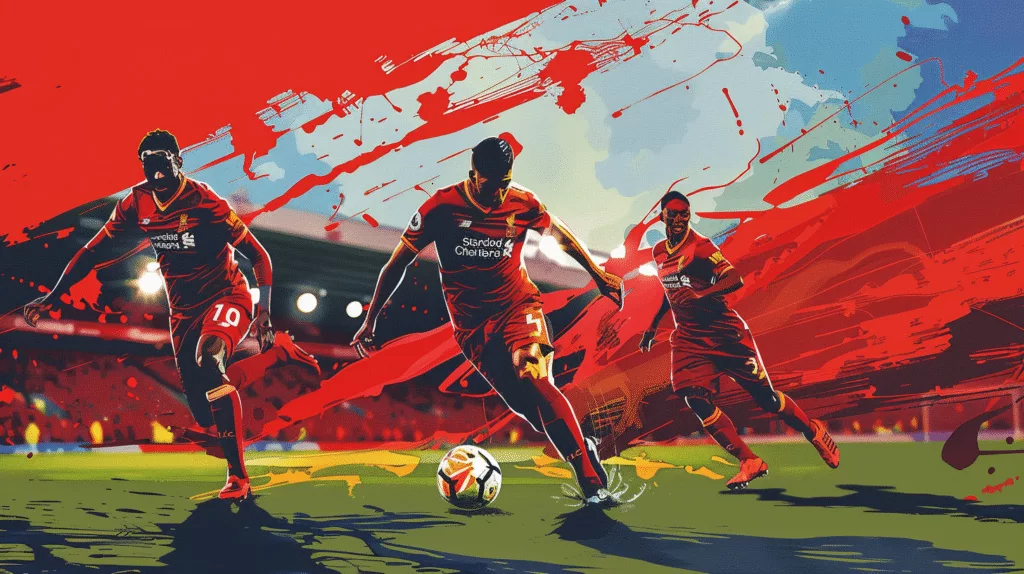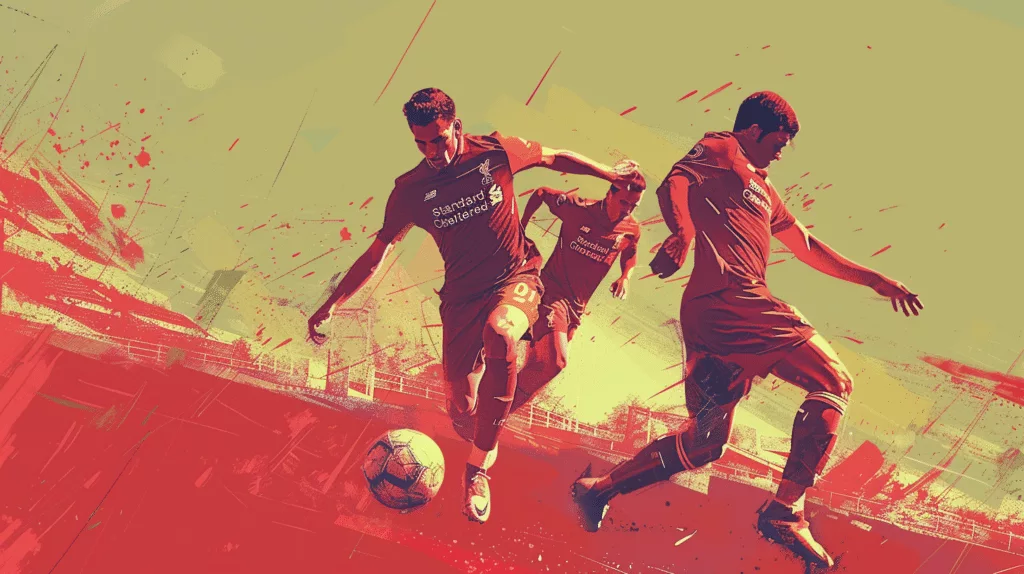On a fateful day in October, Liverpool and Manchester United faced off in what would go down in history as one of the most memorable matches in English football. The final scoreline read Liverpool 7 Manchester United 0, a result that sent shockwaves through the footballing world. This match was not just a victory for Liverpool but a statement of their dominance and a crushing blow to their arch-rivals.
The significance of this match cannot be understated. It was not just a win for Liverpool but a complete dismantling of their bitter rivals. The result showcased the gulf in quality between the two teams and highlighted the contrasting fortunes of both clubs at that time. It was a statement of intent for Liverpool, proving they were the team to beat in the Premier League. It was a wake-up call for Manchester United, exposing their weaknesses and raising questions about their ability to compete at the highest level.
The impact of this match was felt not only on the pitch but also off it. For Liverpool fans, it was a moment of pure joy and celebration. It was a validation of their unwavering support and belief in their team. For Manchester United fans, it was a moment of despair and disappointment. It was a stark reminder of how far their team had fallen and the work needed to get back to the top.
Liverpool’s tactical masterclass: The key to their success
Liverpool’s victory over Manchester United was not just down to luck or individual brilliance. It resulted from meticulous planning and execution by Jurgen Klopp and his coaching staff. Liverpool’s tactics were spot on, exploiting Manchester United’s weaknesses and nullifying their strengths.
One of the key aspects of Liverpool’s tactical approach was their formation. Klopp opted for a high-pressing 4-3-3 system, which allowed his team to suffocate Manchester United’s midfield and force them into making mistakes. The pressing game was executed perfectly, with Liverpool’s midfielders and forwards relentlessly closing down their opponents and winning the ball back in dangerous areas.
Liverpool also targeted Manchester United’s defensive vulnerabilities. The absence of key defenders due to injury meant that United’s backline was makeshift and lacked cohesion. Liverpool’s forwards, led by the deadly trio of Mohamed Salah, Sadio Mane, and Roberto Firmino, exploited this weakness with their pace and movement. They constantly found space behind United’s defense and punished them with clinical finishing.
Manchester United’s defensive woes: Where did it all go wrong?
While Liverpool’s attacking prowess cannot be denied, Manchester United’s defensive performance was disastrous. The team’s defensive strategy was questionable at best, with the defenders making numerous mistakes and the goalkeeper failing to make crucial saves.
United’s defenders were caught out of position time and time again, leaving acres of space for Liverpool’s forwards to exploit. The lack of communication and coordination between the defenders was evident, as they failed to track the runs of Liverpool’s attackers and were easily bypassed.
In addition to the defensive errors, Manchester United also suffered from a lack of quality in goal. The usually reliable David de Gea had an off day, making costly mistakes that led to goals. His poor positioning and decision-making allowed Liverpool to score goals that should have been easily saved.
Furthermore, injuries played a significant role in Manchester United’s defensive struggles. The absence of key defenders such as Harry Maguire and Luke Shaw left a difficult void. The makeshift defense lacked the understanding and chemistry to deal with Liverpool’s attacking threat.
Liverpool’s attacking prowess: Analyzing their goals
Liverpool’s victory over Manchester United was not just a result of defensive errors but also a testament to their attacking prowess. The team scored seven goals, showcasing their ability to create and finish chances.
The breakdown of Liverpool’s goals reveals a pattern of exploiting Manchester United’s weaknesses. The first goal came from a quick counter-attack, with Salah capitalizing on a defensive mistake to slot the ball into the net. The second goal resulted from Firmino’s movement and awareness, as he found space in the box to head home a cross.
Liverpool’s midfielders also played a crucial role in their attacking success. Jordan Henderson and Thiago Alcantara controlled the game from midfield, providing the creativity and vision needed to unlock Manchester United’s defense. Their passing and movement created space for the forwards to exploit.
The weaknesses in Manchester United’s defense were evident throughout the match. The lack of communication and organization allowed Liverpool’s attackers to find space and create scoring opportunities. The absence of key defenders due to injury further exposed United’s vulnerability at the back.
Manchester United’s midfield struggles: A lack of creativity and control
While Liverpool’s midfield was instrumental in their victory, Manchester United’s midfield struggled to make an impact. The absence of key players such as Paul Pogba and Bruno Fernandes was keenly felt, as United lacked creativity and control in their play.
United’s midfielders failed to dictate the game’s tempo and were often overrun by Liverpool’s pressing game. They struggled to retain possession and lacked the vision and passing ability to create scoring opportunities. The absence of Pogba and Fernandes, known for their ability to unlock defenses, was sorely felt.
The lack of creativity in Manchester United’s midfield play was evident throughout the match. The team relied heavily on long balls and individual brilliance rather than intricate passing moves. This made it easier for Liverpool to defend against them, as they could anticipate United’s attacking moves.
Liverpool’s pressing game: How it disrupted Manchester United’s play

One of the key factors in Liverpool’s victory was their relentless pressing game. The team’s midfielders and forwards worked tirelessly to close Manchester United’s players down and disrupt their play.
Liverpool’s pressing game was executed with precision and intensity. The midfielders and forwards constantly harried United’s players, denying them time and space on the ball. This forced United to make mistakes and allowed Liverpool to win back possession in dangerous areas.
The role of Liverpool’s midfielders and forwards was crucial in their pressing game. Henderson, Thiago, and Fabinho led the charge, constantly putting pressure on United’s midfielders and preventing them from dictating the play. Salah, Mane, and Firmino also played a key role, pressing United’s defenders and forcing them to make errors.
The impact of Manchester United’s lack of creativity in their midfield play was evident in their struggles to cope with Liverpool’s pressing game. United could not break through Liverpool’s high press and create scoring opportunities without players who could unlock defenses with their passing and vision.
Manchester United’s counter-attacking failures: A missed opportunity
While Manchester United struggled to create chances through their midfield play, they did have opportunities to counter-attack against Liverpool. However, their forwards and midfielders failed to capitalize on these chances, ultimately costing them the game.
United’s counter-attacking strategy was based on quick transitions and exploiting the space left by Liverpool’s high press. However, their forwards were wasteful in front of goal, failing to convert the chances that came their way. The lack of composure and clinical finishing proved to be their downfall.
In addition to the forwards’ failures, the midfielders struggled to provide the necessary support in counter-attacking situations. The lack of creativity and control in United’s midfield play meant they could not create clear-cut chances for their forwards.
The missed opportunities in the counter-attacking game could have changed the match’s outcome. If United had been more clinical in front of goal and capitalized on their chances, they could have put pressure on Liverpool and potentially turned the tide in their favor.
Liverpool’s squad depth: The impact of their substitutes
One of the key factors in Liverpool’s success this season has been the depth of their squad. This was evident in the match against Manchester United, as their substitutes significantly impacted the game.
Klopp made several changes to his starting lineup, bringing on players like Diogo Jota and Curtis Jones in the second half. These substitutions injected fresh energy into the team and added another dimension to Liverpool’s attacking play.
Jota, in particular, had a standout performance, scoring two goals after coming on as a substitute. His movement and finishing ability added a new dimension to Liverpool’s attack and further exposed Manchester United’s defensive vulnerabilities.
The depth of Liverpool’s squad gives them a significant advantage over their rivals. It allows Klopp to rotate his players and keep them fresh throughout the season, which is crucial in a long and demanding campaign.
Manchester United’s lack of leadership: Who can step up in crisis?
One of the glaring weaknesses in Manchester United’s team is the lack of strong leadership. This was evident in the match against Liverpool, as the team crumbled under pressure and failed to respond to adversity.
In times of crisis, players must step up and take responsibility. However, Manchester United lacked leaders who could rally the team and inspire them to fight back. Strong leadership was absent in their lackluster performance and inability to respond to Liverpool’s dominance.
The impact of this lack of leadership is not limited to individual matches; it also affects the team’s performance in big games. Without leaders who can guide and motivate the team, Manchester United often struggles against top-quality opposition.
What’s next for both teams: The aftermath of the Liverpool 7 Manchester United 0 match.
The result of the Liverpool 7 Manchester United 0 match had far-reaching implications for both teams. For Liverpool, it was a statement of their dominance and a warning to their rivals. It solidified their position as title contenders and sent a message to the rest of the league that they are a force to be reckoned with.
For Manchester United, the result was a wake-up call. It exposed their weaknesses and highlighted the work needed to compete at the highest level. The team’s response to this defeat will determine their future success.
Both managers and players will need to reflect on the match and identify areas for improvement. Klopp will be pleased with his team’s performance but will also be aware that there is still work to be done. Solskjaer, on the other hand, will need to address the defensive issues and find a way to improve his team’s midfield play.
The implications of this match extend beyond this season. It will psychologically impact both teams, shaping their confidence and belief in their abilities. It will provide a boost for Liverpool as they continue their quest for silverware. For Manchester United, it will serve as a reminder of the work needed to get back to the top.
In conclusion, the Liverpool 7 Manchester United 0 match was historic in English football. It showcased Liverpool’s tactical masterclass, Manchester United’s defensive woes, and the impact of both teams’ attacking prowess and midfield struggles. The match also highlighted Liverpool’s pressing game, Manchester United’s counter-attacking failures, and the importance of squad depth and leadership. The aftermath of this match will shape both teams’ seasons and have implications for their future success.
If you’re interested in diving deeper into the tactical analysis of the Liverpool 7 Manchester United 0 Premier League match, you should check out this insightful article from Kicka Football. They provide a comprehensive game breakdown, highlighting key strategies and tactical decisions made by both teams.






